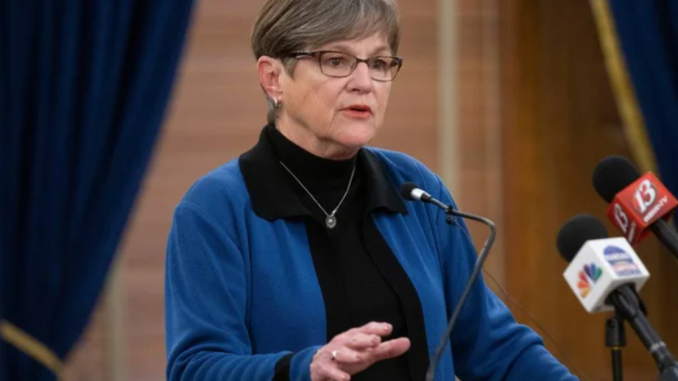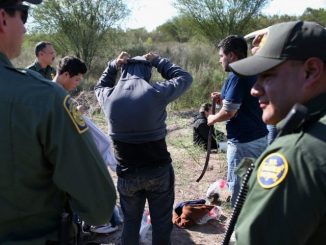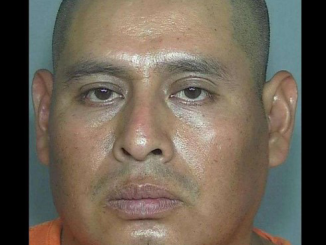
A Wyandotte County ordinance restricting police cooperation with federal immigration authorities was partially invalidated Monday by Gov. Laura Kelly’s signature.
Kelly, a Democrat who is up for reelection in November, signed a bill blocking major parts of Wyandotte’s “safe and welcoming” ordinance. The measure, long sought by immigrant advocates, established municipal IDs and limits how the Unified Government and Kansas City, Kansas, police would work with immigration authorities.
The state law counteracting it will go into effect on July 1.
Kelly signed the bill despite strong Democratic opposition and charges that the measure, proposed by her likely November opponent Republican Attorney General Derek Schmidt, was primarily a campaign tactic. Schmidt was silent in 2020 when Roeland Park and Lawrence passed similar ordinances.
The bill passed with a with a veto-proof Republican supermajority, although House Republicans couldn’t afford to lose a single vote.
$2 for 2 months
Subscribe for unlimited access to our website, app, eEdition and more
CLAIM OFFER
Kelly indicated last month she was unlikely to sign the bill, citing her support for local control.
But in a statement Monday, she echoed Schmidt and other Republicans, asserting that immigration “cannot be resolved at a municipal level.”
“I encourage my colleagues who sent me this bill to persuade our federal delegation to pass comprehensive immigration legislation that allows us to continue growing our economy and meeting our workforce needs here in Kansas,” Kelly said.
She asked for a follow up bill ensuring Kansans who vote with local ID’s could could still vote.
Kelly also announced vetos of three bills, one allowing short term insurance plans, another permitting autonomous delivery vehicles in Kansas and a third barring localities from banning plastic bags. Kelly called the plastic bag legislation a “local decision.”
In a statement, Schmidt pointed to the veto-proof majority on the sanctuary cities bill as proof it was necessary. Sen. Richard Hilderbrand, a Baxter Springs Republican, said Kelly must have “seen some polling” before making her decision.
“Under this new law, Kansas law enforcement will be able to resume working professionally with federal immigration authorities as the needs of public safety require and not be silenced by a patchwork of local ‘sanctuary city’ gag orders,” Schmidt said.
Kelly’s decision was met with immediate outrage from Wyandotte County activists. Marcus Winn, a community organizer with the Metro Organization for Racial and Economic Equity called the decision “a failure of leadership,” “political cowardice,” and a “moral betrayal.”
The bill, he said, violated the values of Kansans and put families at risk.
“It’s clear that there are Kansas political leaders from both parties guided more by personal ambition than the common good of our state,” Winn said. “Moving forward, we plan to remind all our elected officials, regardless of party or position, that they work for the people and hold them accountable.”
Karla Juarez, the executive director of Advocates for Immigrants Rights and Reconciliation, said she agreed with Kelly that there needs to be federal immigration reform. But Juarez was still disappointed in Kelly’s decision to sign the bill.
“I think this was an opportunity for Gov. Kelly to take action,” she said.
In a press conference Monday morning, Wyandotte County leaders and political activists acknowledged that Kelly would face attacks for rejecting the bill, but had urged her to veto it anyway.
“It may be an election year, but this goes far beyond politics. It’s personal,” said Alejandro Rangel-Lopez, who leads the New Frontiers Project, a Kansas-based civic engagement organization.
Wyandotte County passed the “safe and welcoming” ordinance in February, establishing a municipal identification card and limiting how the Unified Government and KCK police department would work with federal immigration authorities.
The ordinance was intended, in part, to help communities of color within Wyandotte County to move freely without fear of law enforcement inquiring about their immigration status or that of their families.
The bill would still allow Wyandotte County to issue municipal IDs but would bar their use for any official state purpose like voting. Furthermore, it prohibits local governments from taking action preventing law enforcement from working with federal immigration authorities.
“We need to ensure that we maintain the ability for all who call Wyandotte County home to feel safe,” KCK Mayor Tyrone Garner said during a news conference urging Kelly to veto the bill.
“And to feel safe, they have to have a level of comfort to want to reach out to their law enforcement community if they fear the perception of crime or they’ve been victimized by crime,” Garner said, “without any type of repercussion that would preclude them from getting the type of services they need that maintains a certain level of human dignity and protection.”
Republican proponents have said the bill is necessary to ensure Kansas has a uniform statewide response to immigration policy rather than a patchwork of local policies.
Opponents called the new law an unjustified overreach into local control. Sen. John Doll, a Garden City Republican, said the Legislature was “slapping” municipal governments much like Will Smith slapped Chris Rock during the Oscars ceremony last month.
Sen. David Haley, a Kansas City Democrat, said the local ordinance in Wyandotte County would make many in the community feel safer. The opposition, he said, was born out of Schmidt’s “thumping his chest” in an effort to play to a conservative base in his candidacy for governor.
* story by The Kansas City Star


